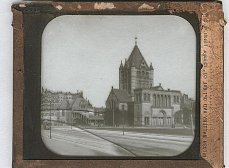 |
 |
In 1895 Donald delivered the commencement address at Tuskegee. In his autobiography, Up From Slavery, Booker T. Washington recounts, “At one of our Commencements I was bold enough to invite Rev. E. Winchester Donald, D. D., rector of Trinity Church, Boston, to preach the Commencement sermon. As we then had no room large enough to accommodate all who would be present, the place of meeting was under a large improvised arbour ... Soon after Dr. Donald had begun speaking, the rain came down in torrents, and he had to stop, while someone held an umbrella over him. The boldness of what I had done never dawned upon me until I saw the picture made by the rector of Trinity Church standing before that large audience under an old umbrella. ... After he had gone to his room, and had gotten the wet threads of his clothes dry, Dr. Donald ventured the remark that a large chapel at Tuskegee would not be out of place. The next day a letter came from two [Northern] ladies who were then travelling in Italy, saying that they had decided to give us the money for such a chapel as we needed.” In that same year Donald established the Trinity Church Oratorical Prize, an award for the best written and best delivered paper on an assigned subject, a student prize that continues at Tuskegee, with different sources of funding, to this day.
Donald and Washington developed a close relationship. In 1897, Washington was invited to deliver an address at the dedication of the Robert Gould Shaw Monument in Boston. Prior to his arrival, Donald sent him a letter. “I hope to see you on the occasion of your visit to Boston to make the address on the unveiling of Shaw’s monument. I told St. Gaudens the other day that he would better understand his long delay in finishing the Shaw statue when he should have heard you speak; and that he will then understand that Divine Providence stayed his hand in the execution of his task until you should be full grown and come to your prime as an orator. After your oration, I shall ask St. Gaudens whether he does not think I told him the truth. With love to Mrs. Washington and the children, I am Ever sincerely yours."
Until the end of his days, in person and in writing, Donald would support the efforts of Washington at Tuskegee and those at other Southern Black schools educating new generations. He supported the efforts of many people inside the U.S. and from abroad trying to make social change. He may have thought he was being militant.
When Donald wanted to host a gathering in support of Berea College in Kentucky with Theodore Roosevelt as speaker, there was resistance. Donald, being strategic, went to longtime vestryman Robert Treat Paine and Paine is remembered as saying, in effect, “When Trinity becomes too good to host such an event, may lightning strike and burn it to the ground.” The meeting took place.
In 1901 Donald delivered a dedication address at Tuskegee for a new building. During the address, Donald would say: “We are in the presence of a fact. Whether or not the negro can be raised to self-respect, industry, thrift and ethical soundness, let the doctrinaires debate. One thing we know, whereas he was blind to his only chance, now he sees. He has only to keep his eyes open and use his chance to rise clean out of the condition into which 200 years of enforced servitude and thirty-five years of stupid, selfish and merciless political exploitation thrust him down.” His words were controversial to some with statements including “an educated negro without a vote is worth infinitely more than ten illiterate white men who vote as often as the polls are open.”
|

